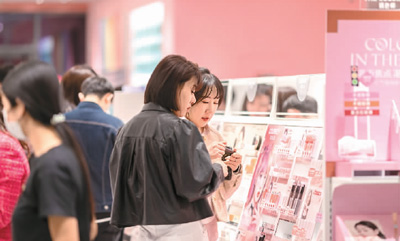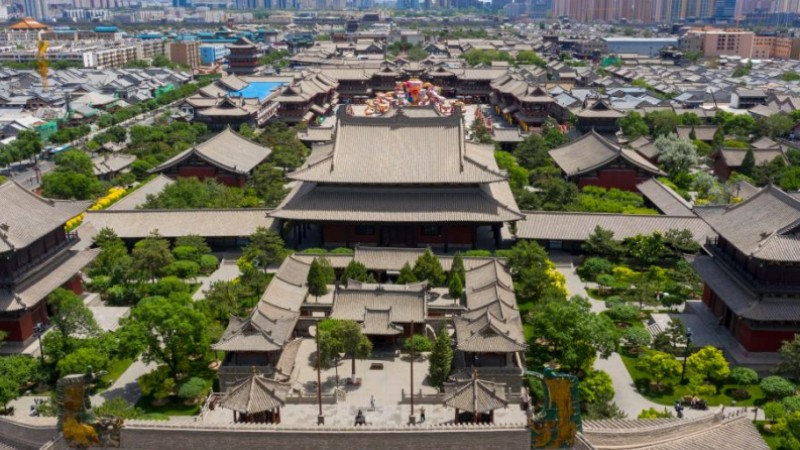Chinese cosmetics gain popularity overseas
Chinese cosmetic brands are increasingly popular in overseas markets thanks to their innovative products and distinctive brand positioning.
Chinese cosmetics, in tandem with Chinese-style makeup and aesthetics, are satisfying overseas consumers' demand for beauty products while promoting traditional Chinese culture.

A vehicle adorned with Florasis advertisements is seen in Tokyo, Japan. (Photo courtesy of Florasis)
In South Korea, a beauty vlogger recommends a Chinese cosmetic brand's concealer, and celebrities favor Chinese beauty brand Into You's lip mud. In Japan, various shows and magazines highlight tutorials for applying Chinese-style makeup, and physical beauty stores include cosmetic counters for Chinese makeup brands like Flower Knows.
Through its cross-border e-commerce sites and channels, Chinese cosmetics brand Florasis has reached consumers in over 100 countries and regions, offering products featuring Chinese culture. The company plans to open its first overseas cosmetic counter this year in Tokyo, Japan.
The total export volume of Chinese cosmetics saw a year-on-year increase of 17.8 percent to $5.72 billion in 2022, whereas imports fell by 10.2 percent to $22.39 billion, according to Chinese customs statistics.
The growth in export volume reflects Chinese cosmetic brands' significant improvements in research and development and creative design.

Workers fulfill orders for products ordered by overseas clients at a cosmetics enterprise in Daixi township, Wuxing district, Huzhou city, east China's Zhejiang Province. (Photo/He Weiwei)
Mu Yunfan, secretary-general of the Shandong Cosmetics Industry Association, emphasized that domestic brands' technology and R&D capabilities have improved significantly, allowing some Chinese brands to compete with international brands in terms of product quality and technological innovation.
Distinct brand positioning enables China's homegrown cosmetic brands to gain substantial overseas followers.
Florasis, for instance, uses the relief carving technique on lipsticks, white porcelain lipstick cases, and the silver jewelry-making technique of the Miao ethnic group for its powder box. This integration of traditional Chinese culture into brand positioning has drawn considerable attention from overseas consumers.
Quality remains crucial for the overseas popularity of Chinese cosmetics. According to an executive of Meishang (Guangzhou) Cosmetics Co., Ltd., owner of the Chinese beauty brand Colorkey, the company invests heavily in technical R&D and product development. In addition to its own factory, the company partners with top global suppliers to produce high-quality products.
The popularity of Chinese cosmetic brands owes much to thorough market research and localized product and marketing strategies. For instance, a Chinese cosmetic company's lipstick is sought after in Japan due to its careful selection of peach and rose red instead of bright red, catering to local consumer preferences.

Consumers purchase domestic cosmetics at a shopping mall in Hohhot, north China's Inner Mongolia Autonomous Region. (Photo/Ding Genhou)
In Vietnam, the Chinese cosmetic brand Perfect Diary selected AMEE, a popular Vietnamese singer, as its brand ambassador for lip makeup. The brand also releases products in shades more suitable for local skin tones.
The effective use of social media is key to the success of Chinese cosmetic brands. For example, a makeup tutorial video shared by Florasis on Instagram garnered over 500,000 likes. A video on how to apply Chinese-style makeup, produced by Florasis in collaboration with a famous Japanese beauty vlogger, showcased the brand's innovative product technology and unique oriental aesthetics. The video attracted widespread attention and even triggered a Chinese makeup craze in Japan.
Independent cross-border e-commerce sites have also facilitated Chinese cosmetic exports. In 2020, Perfect Diary established an independent cross-border e-commerce site in Southeast Asia and began selling its products on Shopee and Lazada, prominent local cross-border e-commerce platforms.
Through these channels, Perfect Diary has achieved remarkable success in Southeast Asia. In the first quarter of this year, sales of the brand's lip makeup and loose powder products ranked first on Shopee's online marketplace in Malaysia and the Philippines, respectively.
The Regional Comprehensive Economic Partnership Agreement (RCEP), which officially entered into force in 2022, has opened vast opportunities for Chinese cosmetic brands' global expansion. A recently released report indicated that the total amount of cosmetics exported from China to other RCEP members increased from $980 million in 2021 to $1.51 billion last year, representing a year-on-year increase of 53.8 percent.
"Thanks to their persistent efforts and active innovation, Chinese cosmetics companies are fully equipped to compete with many international brands," said Wang Maochun, vice president of the China Chamber of Commerce for Import and Export of Medicines and Health Products.
To boost the international development of Chinese cosmetic brands, Wang suggested leveraging the 19 free trade agreements China has signed, improving product competitiveness, and expanding channels for global expansion.
Cao Xuejun, an official with the Ministry of Industry and Information Technology, encouraged China's cosmetics industry to move toward higher-end, smarter and greener development, while enhancing Chinese cosmetic companies' strength and size.
Photos
 2023 "My Story of Chinese Hanzi" international competition kicks off
2023 "My Story of Chinese Hanzi" international competition kicks off Ancient city explores innovative transformation to gain new vitality
Ancient city explores innovative transformation to gain new vitality Yangzhou witnesses integration of traditional culture and culture creative industry
Yangzhou witnesses integration of traditional culture and culture creative industry Datong develops tourism combining rich cultural heritages and well-known attractions
Datong develops tourism combining rich cultural heritages and well-known attractions
Related Stories
- Chinese market key to continued growth of Spanish beauty firms, manager says
- World's earliest synthetic white lead cosmetics found in China's Shaanxi
- Inland county shines a spotlight on global beauty industry
- Domestic-made cosmetics on 40 percent of Chinese Gen Zer's dressing tables
- Residues of 2,700-year-old skin whitening cosmetics found in N China
Copyright © 2023 People's Daily Online. All Rights Reserved.





